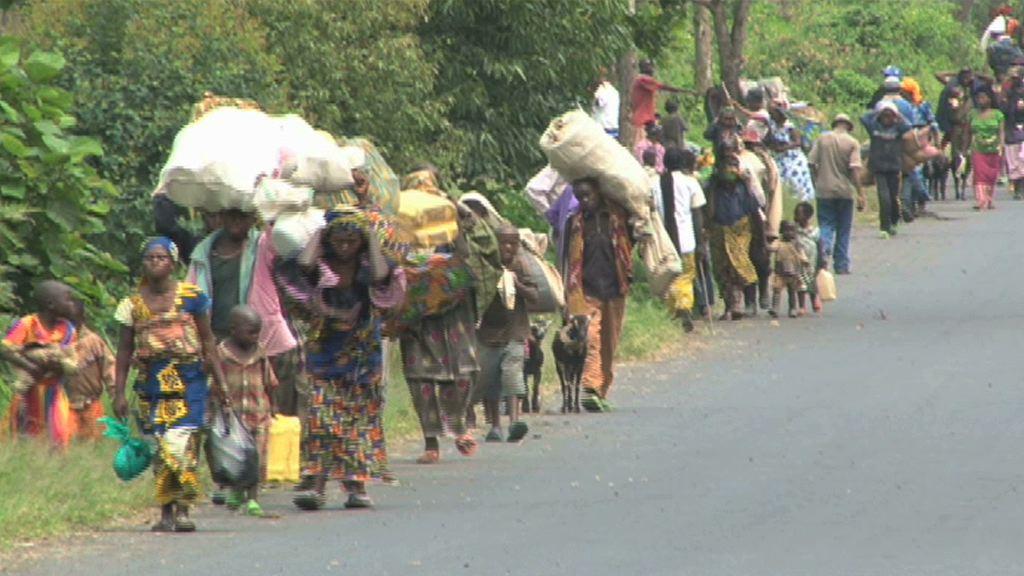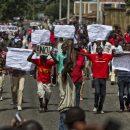Congo: The hunt for Bosco – Kabila turns on his friends – By William Townsend

As the rumour mill turns and suspicion runs rife, conflict is unfolding in eastern Congo’s Kivu provinces once again, following three years of relative calm. The most recent chapter of violence can be traced back to March this year, pitting Congo’s socially and politically maladroit president against some of the very people who helped him achieve electoral victory less than seven months ago.
Having been compelled to accept the outcome of a conspicuously fraudulent ballot last November combined with the conviction in March of another Congolese war lord, Thomas Lubanga, the West appeared keen to stress-test its relationship with President Joseph Kabila over his protection of another indicted war lord, Bosco Ntaganda. The decision to crack down on Bosco, by launching operation Amani Kamilifu or “˜Perfect Peace’, has led to a mutiny and a spate of violent clashes in the east of the country that has seen tens-of-thousands of civilians flee and left NGOs unable to dispense aid.
The Kivus were the scene of some of the most appalling violence during Congo’s civil wars. In an attempt to quell the fighting that continued there long after national peace treaties had been signed, rebel groups such as the Congrí¨s National pour la Défense du People (CNDP) were integrated into the Congolese national army (FARDC) in an agreement signed on March 23rd 2009. The upshot of this agreement was to endorse the CNDP’s control of the provinces they once terrorized. Bosco, a former CNDP commander, was crassly identified by a few as the “lynchpin of stability” and along with his officer corps of former CNDP cronies, has since benefited from state recognition and become comfortably ensconced in his Kivu fiefdom. The price of this “˜stability’ was tacit acceptance of smuggling, requisition of land, effective enslavement of peoples and punitive acts of violence. Not, it is fair to say, a well-charted path to peace in any context.
Undoubtedly, Kabila emerged weaker in the eyes of the international community following the 2011 elections, compared with the 2006 poll. In hunting Bosco, Kabila may be attempting to eschew this image and consolidate power with a show of military strength. This also coincided with the appointment of a new, low-key government in which former “˜big names’ were ousted by a series of technocrats and where larger parties within the presidential coalition obtained fewer high-profile positions, indicating Kabila may also be looking to consolidate his status in the political sphere.
Yet to suggest that packing Bosco off to prison is Kabila’s sole motivation would be shortsighted. With the arrival of special forces in North Kivu’s provincial capital, Goma, at the beginning of April, as well as the redeployment of former-CNDP troops outside of the Kivus, and the arrest of Bosco’s close allies, it appears increasingly likely that Kabila is keen to dismantle the CNDP’s parallel command structure in the east altogether. For better or worse, this undermines the March 23rd agreement between Kabila, the CNDP and Rwandan President, Paul Kagame, leaving the wider CNDP hierarchy, formerly less concerned about Bosco’s liberty, now more vocal as their own prospects suddenly look rather vulnerable.
This apprehension is also reflected by the activity amongst militia groups in the east, with new alliances being formed between mutineers and rebel groups. Added to this, the emergence of the M23, a splinter group of CNDP mutineers who, distancing themselves from the notorious Bosco, cite the lack of a regular wage, poor accommodation and the government failure to uphold the March 23rd agreement. Amid the turmoil, there is growing concern that the pro-Hutu FDLR could fill the security vacuum, further complicating eastern Congo’s already knotted security environment and upsetting relations with neighbouring Rwanda.
To make matters worse, many Congolese officers believe that the CNDP has been benefiting from support extended by Rwanda. In a recent interview with Jeune Afrique and the New Times, Paul Kagame stated that the Bosco mutiny was a “Congolese affair.” Yet his modest overtones belie the actions of a Rwandan President whose relationship and dealings with rebel groups in eastern Congo has, in the past, resembled something of a diplomatic iceberg – with most activity taking place below the surface. Indeed, whilst the FARDC may have scored a number of tactical victories against the CNDP, the upper-echelons of the group’s leadership remain unaccounted for, despite having been routed from its previously safe stronghold in the Masisi highlands. It is entirely conceivable that the group would have faltered unless external support was forthcoming.
The route that this conflict will take is anything but certain and an obvious “˜best case’ solution is yet to present itself. In recent days, Human Rights Watch have indicated that Bosco is again recruiting child soldiers – the pursuit which landed him with an ICC arrest warrant back in 2006. Meanwhile, in the absence of the former-CNDP troops, the FARDC are showing little compassion for the Tutsi population of North Kivu, accusing many of being Rwandan and beating and arresting those who have not yet fled. Such actions do little to persuade the people of North Kivu that Bosco’s incarceration is a necessary phase on the road to peace. That the FARDC has required a systemic overhaul for some time may be a convenient excuse for Kabila to shake things up in the east; for his opponents however the conflict has evolved beyond the protection of Bosco, to ensuring the survival of a parallel CNDP organization in the Kivus.
William Townsend is Editorial Assistant at African Arguments Online.




